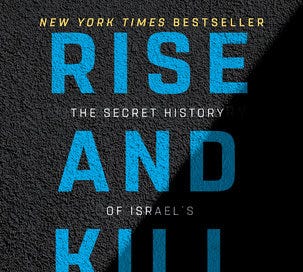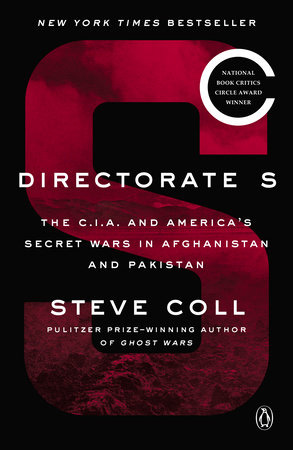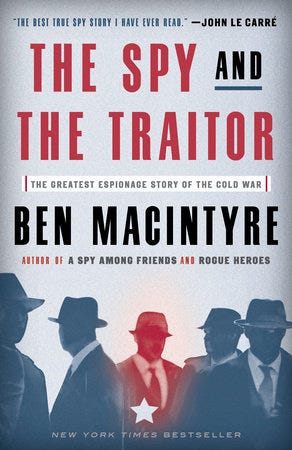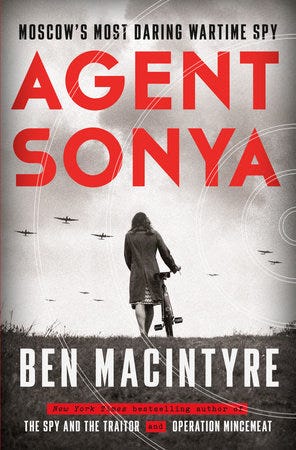Books on Espionage in the Cold War Era
Part 2: Non-fiction spy reads that help explain elements of the Cold War
This second post in my Cold War espionage series focuses on non-fiction books. The global reach of these four books emphasizes the broad expanse of the Cold War and how the conflict was by no means limited to the United States and the Soviet Union. These four books explain the tenuous relationship between carefully laid plans, chance, and how intelligence can sharpen the distinction between the two. These books also expand beyond the confines of the Cold War, emphasizing the long-lasting effects that Cold War relations has had and continues to have on our current state of international affairs.
If you didn’t catch my first post featuring the best fiction books about Cold War espionage, you can find that post here:
Non-Fiction
Directorate S - Steve Coll
~1980s-Present, Afghanistan/Pakistan/US 784 pages
Directorate S is a fascinating look into the geopolitical interests of the United States in the Middle East and South Asia. The initial focus of Coll’s book is the intelligence-sharing alliance between the United States and Pakistan. At the outset of the book, this relationship is being used to protect against the Soviet invasion of Afghanistan and the subsequent rise of the Taliban and related extremists. While the United States used its relationship with Pakistan as a bulwark in the region, Directorate S, a branch of the Pakistani Intelligence Service (ISI), was secretly training and arming the Taliban - the very group the United States wanted to fight against. As the book progresses, Coll emphasizes that the backdoor interactions that the ISI was having with the Taliban were not limited to the pre-9/11 era. Indeed, after 9/11 and the American invasion of Afghanistan, the ISI continued to fund American enemies while accepting American political and financial support, ultimately culminating with the Bin Laden raid that took place in Pakistan.
While Coll adeptly tells the story of this American quagmire and the ways that geopolitical interests are easily complicated, he also provides an astute explanation for why the Pakistani Intelligence Service would double-cross the United States. Coll explains the motivations of Pakistani intelligence leaders who understood the impermanence of American interests in the region and decided to take a bet on the potential threats that could remain long after American troops left. While this book is clearly focused on the Pakistani-American intelligence relationship and its inherent flaws, it is clear that this story can be applied to many different alliances forged between the United States and other post-colonial countries who were forced to make decisions about allying with a temporary foreign interest or focus on the more immediate and long-term issues that would remain after the United States moved on.
Rating: 9/10
Rise and Kill First - Ronen Bergman
Interwar years-Present, Israel/Middle East, 784 pages
Rise and Kill First is a sweeping book written by Israeli investigative journalist Ronen Bergman. The book tells the story of the targeted killing programs run by Israeli military and intelligence services from before its founding in 1948 to the present. The book begins before Israeli independence was declared with a description of the intelligence operations that were created to protect Jews who had moved to the region. After World War II, intelligence operations and targeted killings were expanded not just as a means of internal protection but also as a form of vengeance enacted against Nazi officials and collaborators known to have carried out atrocities against Jewish people during the Holocaust. As the state of Israel grew older throughout the progression of the Cold War era, Bergman describes the expansion of the Israeli intelligence apparatus as well as the evolving way that targeted killings were used against suspected terrorists and enemies of Israel. While descriptions of operations are sleek and evoke scenes out of spy novels (the most James Bond-esque scene taking place in a chic Dubai hotel that includes the killing of a leader of Hamas as Israeli agents change identities in the hotel bathroom), Bergman also forces his readers to confront the ethical dilemmas that are inherently created by the existence of a targeted killing program and the ways that Israeli intelligence has and has not grappled with these pressing moral questions.
Rating: 8/10
Ben Macintyre
I view Ben Macintyre as the non-fiction analog to John le Carré. Ben Macintyre specializes in World War II and Cold War espionage histories, but he writes them in ways that read like fiction. Below are my two favorite Ben Macintyre books.
The Spy and the Traitor
late-Cold War, England/USSR/US, 384 pages
This book might possibly be one of my favorite books of all time and that is saying something. Despite being non-fiction, this book reads like a novel both in the way that Macintyre writes and also what he is writing about. The Spy and the Traitor is about the life of Oleg Gordievsky, a career KGB agent who rises to the top post in London all the while working as a double agent for MI6. Despite the tight-knit intelligence sharing relationship between the United States and the United Kingdom, MI6 was careful to never share the name of their high-value source with the CIA in an attempt to protect his identity. However, this secrecy only acted to fuel the curiosity of Aldrich Ames, a CIA officer later discovered to be acting as a double agent for the KGB, who ultimately identified Gordievsky’s identity. Ames’ identification prompts one of the more heart-pumping scenes in the book, as Gordievsky is extracted out of Moscow to the safety of English obscurity.
The Spy and the Traitor is a book about chance and the way that well-sourced intelligence can alter the course of history. As a double agent with nearly unrestricted access, Gordievsky worked to foil Soviet intelligence plots and de-escalate nuclear tensions between the major powers. In one particularly jarring scene, Macintyre describes the way Gordievsky prevented the Soviets from launching a preemptive nuclear strike after Soviet officials became increasingly convinced that the movement of British nuclear bombers meant that the British were planning on attacking the Soviet Union. Macintyre makes a strong argument that Gordievsky’s intelligence saved the world from nuclear disaster on more than one occasion at great risk to his personal safety. When people talk about the height of the Cold War they are generally referring to the 1950s and 1960s when the United States and the Soviet Union jockeyed to develop nuclear weapons and expand their respective spheres of influence. The high-stakes scenes of this book take place in the later years of the Cold War, emphasizing the prolonged extent of the tensions between the Soviet Union and the Western Allies, as well as the prolonged lethal stakes.
Rating: 10/10
Agent Sonya
WWII-Cold War, global, 400 pages
Agent Sonya is Ben Macintyre’s most recent book and it does not disappoint. Macintyre examines the life of Ursula Burton, a high-ranking Soviet intelligence officer who fell into the world of spy craft seemingly by mistake. Described as an ambitious and restless woman looking for meaning, Burton gets recruited by Soviet intelligence before World War II after her husband gets a job opportunity with an architecture firm based in Shanghai. While there, Ursula proves her talent and is given increasingly important (and oftentimes dangerous) missions in Japan, China, and England. The book begins and ends in the Cotswolds where Ursula settles, and it is there that she works to pass secrets gathered by a prominent physicist to the Soviets to help them build the atom bomb, thus raising the stakes in the Cold War. Ursula (code name Sonya) is a real spy lost to history, and Macintyre does a tremendous job bringing her to life and expounding on the ways in which her spy work and intelligence collection had a hand in shaping the world. Much like his other works, the book is also an interesting meditation on ideological allegiances and how people without national connections - Ursula was German, not Russian - can be motivated to commit treasonous acts out of political and ideological fervor.
Rating: 9/10
If you like what I’ve written or want to see more reviews, recommendations, and round-ups about a wide range of novels, histories, and more, consider subscribing now by entering your email or sharing with a friend.






